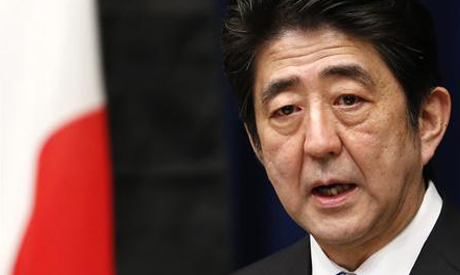
Japan's Prime Minister Shinzo Abe (Photo: Reuters)
Japan's cabinet on Thursday approved a set of bills bolstering the role and scope of the military, as the pacifist country redefines its position in the increasingly roiled Asia-Pacific region.
The bills are a pet project of nationalist Prime Minister Shinzo Abe, who says Japan can no longer shy away from its responsibility to help safeguard regional stability, and must step out from under the shade of the security umbrella provided by the United States.
The draft legislation, which will go before lawmakers in the coming months, formalises a decision made by the cabinet last year to broaden the remit of Japan's well-equipped and well-trained armed forces.
It would allow them to go into battle to protect allies -- so-called "collective defence" -- something currently banned by a strict reading of Japan's pacifist constitution.
"Protecting the peace and lives of its people is a country's most important responsibility," chief cabinet secretary Yoshihide Suga told reporters.
"The security situation surrounding our country is extremely tense. So as to ensure peace and stability, we need to strengthen the Japan-US alliance and to enhance trust and cooperation among partners in the region.
"It is important to be ready for any eventuality. The purpose of the bills is to strengthen the deterrent and prevent conflict from happening."
Washington -- which imposed the never-altered constitution on a defeated Japan during its post-World War II occupation -- has long called for Tokyo to take on a more active role in their mutual security pact.
But the Japanese public is suspicious of anything that seems to lessen the commitment to pacificism, and insists its armed forces should only ever be used in a narrowly-defined defence of Japan.
Critics of the security moves say eroding this principle could see Tokyo dragged into American military adventures in the Middle East, a claim advocates reject.
Hundreds of people rallied in front of Abe's office Thursday, holding banners condemning the proposed legal changes.
"I don't believe that enabling the Self-Defense Forces (military) to deploy abroad will lead to peace," Takuma Anzai, 19, told Jiji Press.
"The bills will eventually serve as a green light to join an American war. It is clearly a violation of the constitution," said 66-year-old Akemi Kitajima.
Another group of hundreds of women demonstrated in the upscale Ginza shopping district in Tokyo, chanting "let's protect our children" and holding banners with anti-war messages.
Abe also faces Chinese charges that he is re-militarising Japan by stealth in a bid to return to its warring ways of the 20th century. The prime minister and his supporters deny this.
The legislation, which would overhaul 10 security related laws and create a new one, would pave the way for the military to deploy abroad on non-combat assignments such as disaster relief and UN peacekeeping missions.
Revisions include removing geographical constraints on logistical support for friendly forces in "situations that would significantly affect Japan's security".
They also say Japan can defend allies "in situations where there is a clear risk that Japan's existence is threatened and its people's rights...are compromised through an attack on a country which has a close relationship with Japan".
The bills were formally agreed by the ruling bloc -- Abe's Liberal Democratic Party and its centre-right junior coalition partner Komeito -- before the cabinet meeting, public broadcaster NHK reported.
The cabinet discussion comes as Japan hosts its first ever global arms fair, the result of relaxation in rules banning the sale of weapons abroad, as part of a bid to shore up the domestic arms industry.
Short link: